
Spring is the season of growth, regeneration, increased activity and new beginnings. During the season of spring, people experience many changes. Allergies, high blood pressure, headaches, sinus pain and congestion, anger, irritation and tendon problems are just some of the issues common to the spring months. Many of these problems can be attributed to increased wind in the environment. And while there is nothing that can be done about external wind, internal wind can be addressed and diminished using Traditional Chinese Medicine (TCM) and the many modalities it incorporates.
In TCM, there are lots of correspondences and associations. Spring is the season of wood, the liver and the gallbladder. The liver is in charge of detoxification and keeping the energy or Qi (pronounced “chee”) flowing smoothly. The gallbladder governs decision making and controls the sinews of the body.
When the liver and gallbladder are not functioning properly, the Qi becomes blocked and disease can occur. Both the liver and gallbladder also help with digestion. But it frequently happens that repressed anger and excessive stress can lead to the development of gallstones.
To keep the liver and gallbladder working smoothly, things like acupuncture, herbal formulas, nutritional counseling, tai chi and qi gong are all recommended. Acupuncture utilizes over 300 different pressure points on the body to help keep it in alignment and free from disease. And there are specific points that can be used to help balance the body during the season of spring. Let’s look at a few of them.
1. Liver 3 – This point is located bilaterally on the top of the foot, in the depression about one thumb-breadth from the edge of the webbing between the first and second toes. This point can be used to decrease headaches, nasal congestion and depression.
2. Large Intestine 20 – Found bilaterally on either side of the nose, in the nasolabial groove, level with the lower border of the nostril. This point is very effective for decreasing nasal pain and obstruction, as well as helping decrease rhinorrhea, also known as a runny nose. These symptoms are quite common with allergies that occur during spring.
3. Gallbladder 34 – This point is located bilaterally on the outer side of the lower leg, in the depression behind the head of the fibula. Gallbladder 34 is the influential point of the tendons and is used specifically for pain in the lower extremities. The tendons can freeze up during spring after they have been somewhat dormant during the winter months.
4. Liver 14 – Located bilaterally on abdomen, directly below the nipple, four thumb-breadths from the midline, in the sixth intercostal space. Liver 14 promotes the smooth flow of liver Qi and benefits the digestive tract.
5. Urinary Bladder 18 – This point is located bilaterally on either side of the spine, at the lower border of the ninth thoracic vertebra, about one and a half thumb-breadths from the spine. This point benefits both the liver and the gallbladder, smooths liver Qi and decreases anger and irritability.
Any of these points can be used alone or in conjunction with others. They can be manually stimulated using pressure from a finger or dull, rounded tool. But for best effects, it is recommended acupuncture be applied.



